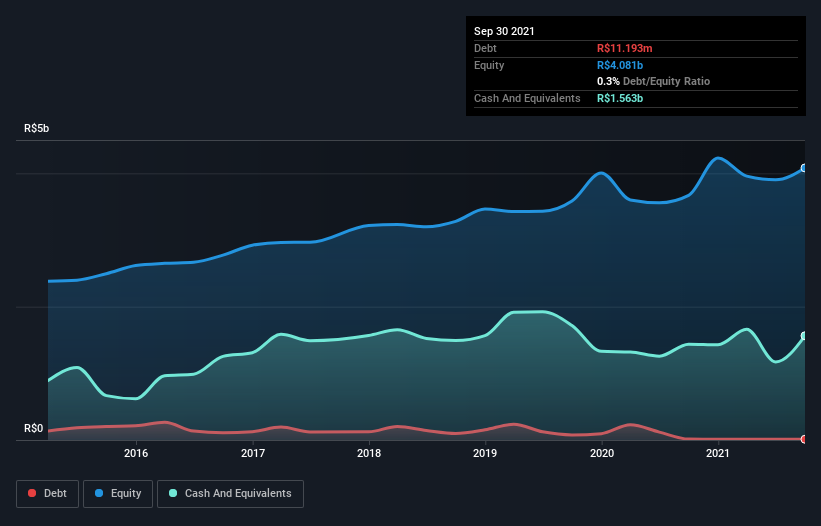Warren Buffett famously said, 'Volatility is far from synonymous with risk.' It's only natural to consider a company's balance sheet when you examine how risky it is, since debt is often involved when a business collapses. As with many other companies Grendene S.A. (BVMF:GRND3) makes use of debt. But should shareholders be worried about its use of debt?
When Is Debt Dangerous?
Debt and other liabilities become risky for a business when it cannot easily fulfill those obligations, either with free cash flow or by raising capital at an attractive price. In the worst case scenario, a company can go bankrupt if it cannot pay its creditors. While that is not too common, we often do see indebted companies permanently diluting shareholders because lenders force them to raise capital at a distressed price. Of course, debt can be an important tool in businesses, particularly capital heavy businesses. When we examine debt levels, we first consider both cash and debt levels, together.
Check out our latest analysis for Grendene
How Much Debt Does Grendene Carry?
The image below, which you can click on for greater detail, shows that Grendene had debt of R$11.2m at the end of September 2021, a reduction from R$14.0m over a year. But on the other hand it also has R$1.56b in cash, leading to a R$1.55b net cash position.

How Strong Is Grendene's Balance Sheet?
The latest balance sheet data shows that Grendene had liabilities of R$275.2m due within a year, and liabilities of R$85.7m falling due after that. Offsetting this, it had R$1.56b in cash and R$1.06b in receivables that were due within 12 months. So it can boast R$2.26b more liquid assets than total liabilities.
This surplus suggests that Grendene is using debt in a way that is appears to be both safe and conservative. Because it has plenty of assets, it is unlikely to have trouble with its lenders. Simply put, the fact that Grendene has more cash than debt is arguably a good indication that it can manage its debt safely.
On the other hand, Grendene's EBIT dived 10%, over the last year. If that rate of decline in earnings continues, the company could find itself in a tight spot. When analysing debt levels, the balance sheet is the obvious place to start. But it is future earnings, more than anything, that will determine Grendene's ability to maintain a healthy balance sheet going forward. So if you're focused on the future you can check out this free report showing analyst profit forecasts.
Finally, a company can only pay off debt with cold hard cash, not accounting profits. Grendene may have net cash on the balance sheet, but it is still interesting to look at how well the business converts its earnings before interest and tax (EBIT) to free cash flow, because that will influence both its need for, and its capacity to manage debt. During the last three years, Grendene produced sturdy free cash flow equating to 67% of its EBIT, about what we'd expect. This cold hard cash means it can reduce its debt when it wants to.
Summing up
While we empathize with investors who find debt concerning, you should keep in mind that Grendene has net cash of R$1.55b, as well as more liquid assets than liabilities. The cherry on top was that in converted 67% of that EBIT to free cash flow, bringing in R$178m. So we don't think Grendene's use of debt is risky. The balance sheet is clearly the area to focus on when you are analysing debt. But ultimately, every company can contain risks that exist outside of the balance sheet. For instance, we've identified 3 warning signs for Grendene (2 are a bit unpleasant) you should be aware of.
At the end of the day, it's often better to focus on companies that are free from net debt. You can access our special list of such companies (all with a track record of profit growth). It's free.
New: Manage All Your Stock Portfolios in One Place
We've created the ultimate portfolio companion for stock investors, and it's free.
• Connect an unlimited number of Portfolios and see your total in one currency
• Be alerted to new Warning Signs or Risks via email or mobile
• Track the Fair Value of your stocks
Have feedback on this article? Concerned about the content? Get in touch with us directly. Alternatively, email editorial-team (at) simplywallst.com.
This article by Simply Wall St is general in nature. We provide commentary based on historical data and analyst forecasts only using an unbiased methodology and our articles are not intended to be financial advice. It does not constitute a recommendation to buy or sell any stock, and does not take account of your objectives, or your financial situation. We aim to bring you long-term focused analysis driven by fundamental data. Note that our analysis may not factor in the latest price-sensitive company announcements or qualitative material. Simply Wall St has no position in any stocks mentioned.
About BOVESPA:GRND3
Grendene
Engages in the development, production, distribution, and sale of plastic footwear for women, men, and children in Brazil and internationally.
Excellent balance sheet with proven track record and pays a dividend.
Market Insights
Community Narratives




